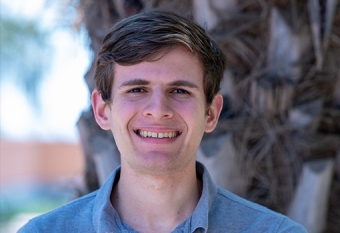
Evan Pretti, a fourth-year chemical engineering PhD student at UC Santa Barbara, has received a prestigious Software Fellowship from the Molecular Sciences Software Institute (MolSSI) in support of research that could provide insight into neurodegenerative diseases such as Alzheimer’s disease. The fellowship provides funding for tuition and fees for one year, a $40,000 stipend, and travel allowances to cover visits to the institute’s headquarters. The fellowships are intended to recognize advanced graduate students and postdoctoral researchers who are developing software infrastructure, middleware, and frameworks that will benefit computational molecular sciences.
“It is great to receive this fellowship to support some of the research directions that I have been pursuing,” said Pretti, who is advised by chemical engineering professor M. Scott Shell. “None of this would have been possible without the exceptional guidance, support, and mentorship of my advisor, Professor Shell. And I am additionally thankful for various discussions that I have had with my colleagues in the Shell group and other groups working on similar research at UCSB in the course of doing my research.”
Pretti develops models to simulate protein aggregation, in order to gain molecular insight into the aggregation of tau, a protein that stabilizes the internal skeleton of neurons in the brain. The aggregation of tau protein is implicated in Alzheimer’s disease and several other neurodegenerative diseases, but the mechanisms that cause tau to form fibrils with particular, disease-specific structures that propagate in these pathologies are poorly understood.
To simulate systems of complex molecules like tau, Shell group members use advanced sampling techniques, including one known as replica exchange, in which many copies of a system are simulated in parallel at different temperatures. The technique allows researchers to accelerate the simulation of configurations of aggregating protein fragments that otherwise would take a prohibitively long time to form.
The problem with the conventional replica exchange approach is that it requires large amounts of computational power to complete the necessary simulations in a reasonable timeframe. The goal of Pretti’s MolSSI project is to develop a software package that uses the highly optimized, graphical processing unit (GPU)-enabled OpenMM simulation engine in order to run fast simulations with many replicas while intelligently distributing the workload in one GPU or across any number of GPUs. OpenMM is an open-source library for performing molecular dynamics simulations on a wide variety of hardware. Existing software packages using OpenMM, according to Pretti, do not allow for rapid parallel replica exchange simulations in this manner.
“We have various strategies for speeding up these simulations that are specific to our protein-model optimization problem,” said Pretti, whose previous honors include a Graduate Research Fellowship from the National Science Foundation. “A generalized and more automated and self-contained approach to setting up and running these simulations will be extremely useful.”
The software will enable researchers to study large structures of aggregated tau to gain fundamental insight into tau-related neurodegenerative diseases. Beyond tau, this software will be applicable to simulate a wide range of complex and molecular systems by taking maximum advantage of modern high-performance computing hardware.
“This could aid other researchers in the Shell group who use simulations of this kind, as well as in the wider molecular-simulation research community,” said Pretti, who earned his bachelor’s degree in chemical engineering from Lehigh University.
Pretti especially looks forward to receiving guidance and mentoring from software scientists at MolSSI during the fellowship.
“Interacting with experts in both software development and molecular simulation will be useful,” he says, “in overcoming technical challenges and building a flexible and useful programming interface to the package.”
The 2023-’24 MolSSI Fellows will spend a week at the institute’s headquarters this summer to interact with software scientists during their “Software Best Practices Boot Camp.”



